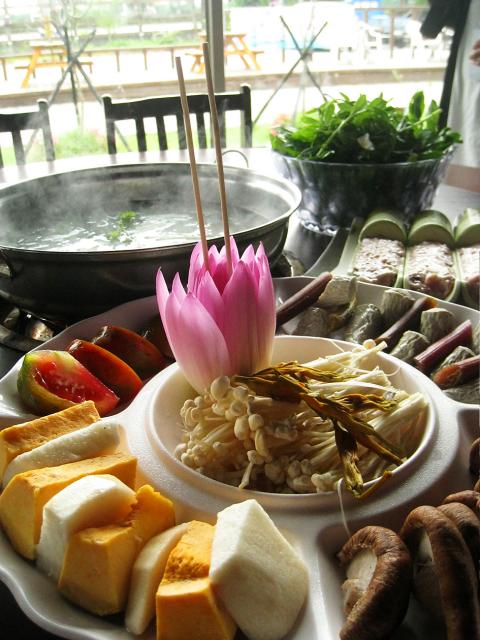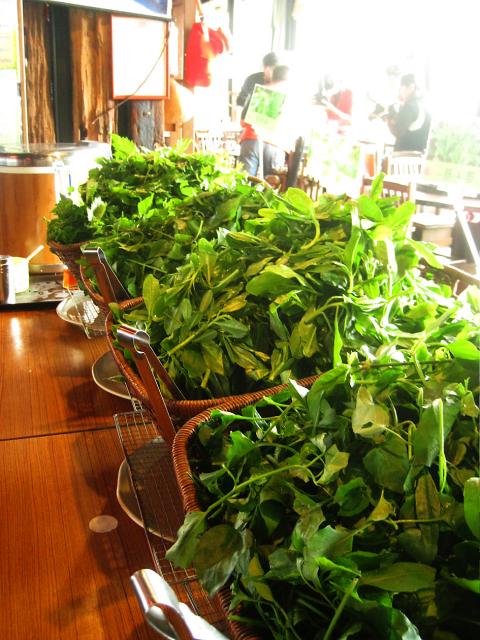The Cherry Field Restaurant, though established by an immigrant from Taipei, has become one of Hualien’s showcase dining establishments. Health is front and center at Cherry Field, as owner Chen Ying-mei (陳櫻美) created the restaurant after coming to Hualien to recover from surgery for thyroid cancer. Friends from around the county, including Hakka, Hoklo and Aboriginal people, told her about many different folk remedies making use of Hualien’s vast selection of flora, much of it ignored by mainstream agriculture. She has included this experience in the creation of Cherry Field, a hot pot restaurant whose main feature is its buffet of five kinds of foraged wild greens that not only provide a unique flavor, but also all kinds of healthful benefits (including reduced cancer risk).
Personally I am always slightly dubious about restaurants that put health before flavor, as their claims for various therapeutic effects seem to be little more than an excuse for dishes lacking either character or balance. I was therefore rather skeptical about Cherry Field, but the buffet of vibrant-looking greens on the sideboard looked remarkably appealing. Staff encourage diners to use a mixture of all five available greens, which are selected from a range of 16, depending on availability. I had not heard of many of these plants, and the selection of nine herbal broths into which these greens were to be immersed was equally unfamiliar, though I did recognize aged radish and ginseng. The broths are all light, and need the wild greens to give them complexity. It is further enriched by meat, fish and other mainstream vegetables. A healthy hot pot (養生火鍋) with meat is NT$390 a head, featuring unlimited access to wild greens, chicken, pork and fish. A vegetarian version with a good selection of mushrooms to replace the meat is NT$300.
If the mix of wild greens is simply too medicinal in flavor (and it has to be admitted, these greens mostly fall into the category of bitter herbs, which accounts for their lack of popularity in the regular vegetable market, and is also a reason why they can grow successfully without the aid of pesticides), Cherry Field offers a wide selection of innovative and mainstream hot pots from heavily marbled “snow flake” prime beef hot pot (霜降牛肉鍋, NT$390 a head) to pumpkin hot pot (南瓜鍋, NT$250 a head). While there are plenty of vegetarian options available, meat eaters are catered to with a plentiful selection of choice and prime cuts.

Photo: Ian Bartholomew, Taipei Times
Cherry Field is primarily a hot pot restaurant and is ideally suited for tables of four and above. That said, the establishment also offers a selection of individual sets and a la carte dishes, many of them vegetarian. Quality is well above average and its pork trotter with dry pickled Chinese mustard (陳梅弄豬手, NT$200) and mountain yam with monkey head mushrooms (山藥猴頭菇, NT$200) are highly recommended.
Although the setting at Cherry Field is casual, considerable care is taken over presentation, and a high point of a hot pot meal is the immersion of a lotus flower into the pot at the beginning of the meal. Inevitably, health benefits are attributed to the flower, but the effect is also quite beautiful, and gives the meal a lovely sense of theater. The big cavernous interior of the restaurant can be a bit intimidating for couples, but the space has been well divided to provide a degree of intimacy for smaller tables.
Service is efficient and staff are helpful in instructing diners in the best way of navigating the complex menu. The selection of food is wide enough that healthy eaters and gourmands can all find some degree of satisfaction, and for those who find something that really flips their switch, many of the condiments used in the preparation of food at Cherry Field (most made by the restaurant), are also available to take home. It goes without saying that Cherry Field’s food ticks all the health boxes from high fiber, organic, low salt and of course no MSG.

Photo: Ian Bartholomew, Taipei Times

In the March 9 edition of the Taipei Times a piece by Ninon Godefroy ran with the headine “The quiet, gentle rhythm of Taiwan.” It started with the line “Taiwan is a small, humble place. There is no Eiffel Tower, no pyramids — no singular attraction that draws the world’s attention.” I laughed out loud at that. This was out of no disrespect for the author or the piece, which made some interesting analogies and good points about how both Din Tai Fung’s and Taiwan Semiconductor Manufacturing Co’s (TSMC, 台積電) meticulous attention to detail and quality are not quite up to

April 21 to April 27 Hsieh Er’s (謝娥) political fortunes were rising fast after she got out of jail and joined the Chinese Nationalist Party (KMT) in December 1945. Not only did she hold key positions in various committees, she was elected the only woman on the Taipei City Council and headed to Nanjing in 1946 as the sole Taiwanese female representative to the National Constituent Assembly. With the support of first lady Soong May-ling (宋美齡), she started the Taipei Women’s Association and Taiwan Provincial Women’s Association, where she

It is one of the more remarkable facts of Taiwan history that it was never occupied or claimed by any of the numerous kingdoms of southern China — Han or otherwise — that lay just across the water from it. None of their brilliant ministers ever discovered that Taiwan was a “core interest” of the state whose annexation was “inevitable.” As Paul Kua notes in an excellent monograph laying out how the Portuguese gave Taiwan the name “Formosa,” the first Europeans to express an interest in occupying Taiwan were the Spanish. Tonio Andrade in his seminal work, How Taiwan Became Chinese,

Mongolian influencer Anudari Daarya looks effortlessly glamorous and carefree in her social media posts — but the classically trained pianist’s road to acceptance as a transgender artist has been anything but easy. She is one of a growing number of Mongolian LGBTQ youth challenging stereotypes and fighting for acceptance through media representation in the socially conservative country. LGBTQ Mongolians often hide their identities from their employers and colleagues for fear of discrimination, with a survey by the non-profit LGBT Centre Mongolia showing that only 20 percent of people felt comfortable coming out at work. Daarya, 25, said she has faced discrimination since she